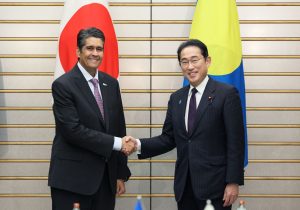The Pacific island nation of Palau needs U.S. help to deter China’s “unwanted activities” around its coasts, its leader said Thursday and repeated his government’s determination to maintain diplomatic ties with Taiwan.
Palau’s President Surangel Whipps Jr. told a news conference in Tokyo that three Chinese boats have made “uninvited” entries into his country’s waters since he took office in 2021, stressing the need for further U.S. backing to enhance deterrence against China’s assertive move in the region.
“The United States is responsible for our security, and we would also inform them that we need them to engage and help us in deterring any unwanted activities,” Whipps said.
Whipps said Chinese vessels appeared to be conducting surveying activities in the Palau waters “without our permission.” He said they sailed in straight from China as they approached very slowly over sensitive areas where fiber optic cables exist. He described the activity as “a violation of international rules-based order.”
The first thing Palau’s maritime authorities would do in such cases is to call up the U.S. Coast Guard, but its units are based in Guam and may not always be able to come to the rescue, such as in case of a typhoon, he said.
Even though China’s presence is important for Palau’s economy and tourism, the island nation still maintains diplomatic ties with Taiwan.
“Our administration has made clear that we are enemies to none, friends to all,” Whipps said. “As long as we are friends of Taiwan, we accept anybody to be our friend, but that friend cannot tell us you cannot be somebody else’s friend because he is not our friend.”
Whippes suggested his country was punished for keeping diplomatic ties with Taiwan, citing the sharp drop in Chinese tourists, who accounted for about two-thirds of Palau’s tourism until late 2010s, to near zero.
“We will continue to be a strong ally and friend of Taiwan,” said Whipps. “As long as I’m the president, I’m not changing.”
The United States and its ally Japan, as well as Australia, have been stepping up their economic and security cooperation and engagement in the Pacific region in the face of China’s increasingly assertive activity there.
On May 22, Palau and the United States signed an agreement renewing funding arrangements under their Compact of Free Association. The COFA agreement gives the United States exclusive rights to deploy military assets within Palau’s land and territorial waters. In exchange, Washington commits to providing financial assistance to Palau, as well as allowing its nationals to freely live and work in the United States.
U.S. Secretary of State Antony Blinken, who attended the signing ceremony in Papua New Guinea, said that the United States would provide $7.1 billion in aid to COFA partners over the next 20 years. In addition to Palau, the U.S. has Compacts of Free Association with the Federated States of Micronesia and the Republic of the Marshall Islands.
Prime Minister Kishida Fumio, during his talks Thursday with Whipps, pledged Japanese support for Palau’s tourism promotion, infrastructure reinforcement and other areas, while strengthening economic and security cooperation between the two countries.
During his visit in Japan, Whipps also visited the tsunami-wrecked Fukushima Daiichi nuclear power plant to see its preparation for a planned release of treated radioactive wastewater into the Pacific Ocean this summer. He said he trusts Japan’s safety measures and felt reassured after visiting and the plant and the region first hand.
The plan has faced fierce protests from local fishing communities concerned about safety and reputational damage. Nearby countries, including South Korea, China, and a number of Pacific Island nations, have also raised safety concerns.
Japanese officials say the water is tested, and will be diluted with massive amounts of seawater before sea discharge over decades, making it harmless to people and marine life. Some respected scientists say the impact of long-term, low-dose exposure to radionuclides is unknown and the release should be delayed.

































